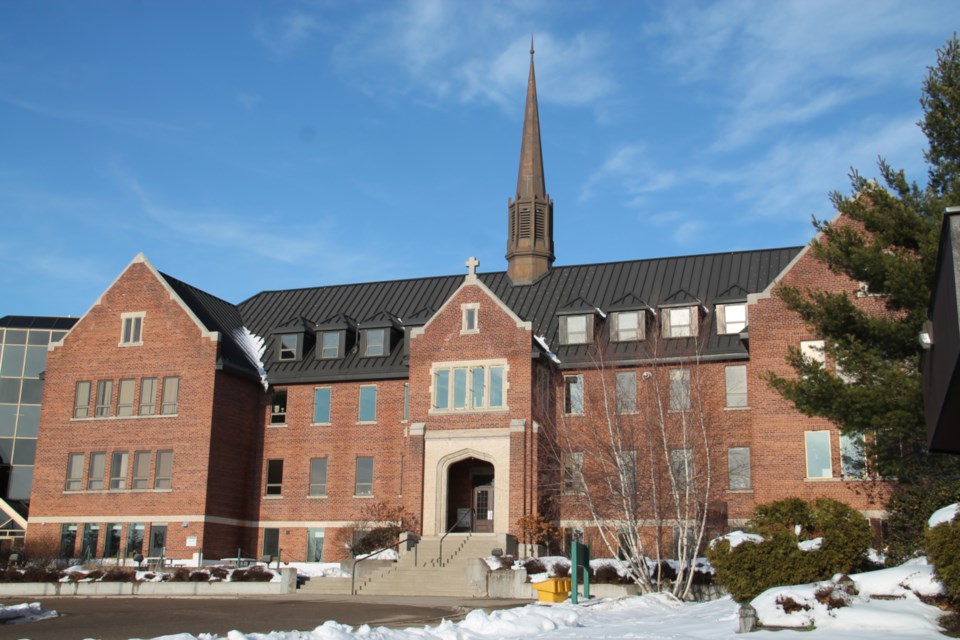Algoma University is hoping to submit a proposal to the province for the establishment of a Northern Ontario Institute for the Prevention and Treatment of Mental Illness and Addictions, along with its Indigenous partners at Shingwauk Kinoomaage Gamig (SKG) and Sault Area Hospital (SAH).
Asima Vezina, Algoma University president and vice chancellor, speaking to reporters after Thursday’s board of governors meeting, said Algoma and its partners are in the early stages of conversation about such an institute.
“We know mental health and addictions is a huge issue for this community and quite frankly for all communities, so we think the university, in partnership with the Indigenous institute across the road, Shingwauk Kinoomaage Gamig, and Sault Area Hospital, that together, with the support of other partners, that we could actually be designing programming and graduates that are really well prepared to work on some of the challenges that we’re facing,” Vezina said.
“There’s more to come on that, but it’s an interesting proposal we think could really benefit all of northern Ontario.”
“We’re just looking at our programs right now and we plan to move some things forward whether we get the funding or not. It’s really about looking at the talent our community needs right now around mental health counselling and addictions, so that’s our social work program, sociology, health sciences, biology (and) Anishinaabe Studies.”
“We know the way we’re treating mental health and addictions today is not working,” Vezina said.
“We believe if we work really closely together with partners in health care that we can design programming for students that come here that can really make change in the community.”
Vezina said Algoma and its partners would like to see some mental health and addictions programming up and running as early as 2022.
“A lot of it’s going to depend on whether we can rally up the funding to be able to do that, but some of the programming pieces we can start to move forward whether we have it or not,” Vezina said.
The board also received documentation regarding what economic impact Algoma University is having on the community at Thursday’s meeting.
The economic impact analysis was carried out by U.S. labour market analytics firm Emsi and presented by Susan Hackett, an Idaho-based economic consultant.
Emsi’s analysis stated Algoma’s day-to-day operations spending added $20.9 million in income to the region during the 2017-2018 fiscal year.
“The $20.9 million in added income is equivalent to supporting 270 jobs in the region,” the analysis stated.
Student spending “generated $1.6 million in added income for the regional economy in 2017-18,” Emsi found.
In addition, the analysis reads “today, thousands of former AU students are employed in Sault Ste. Marie. As a result of their AU educations, the students receive higher earnings and increase the productivity of the businesses that employ them. In 2017-18, AU alumni generated $56.8 million in added income for the regional economy, which is equivalent to supporting 782 jobs.”
“It (the economic impact analysis) will be a tool for communication,” Algoma University President Vezina told reporters.
“We want to make sure people within the community understand the impact the university is having on the overall economic results in the community. Most significant proposals require us to show the overall return on the investment, so this really helps us situate hard facts into different funding proposals that we’re going to be moving forward in the next couple of years.”
Vezina said such documentation was used in making a presentation to Brampton’s city council when Algoma requested $7 million for an expansion to the university’s Brampton campus.
Other proposals are in for some more work to be done on the Shingwauk Residential School Centre facilities and archival space and a renovation for Algoma’s School of Business and Economics.
Vezina said Algoma, with economic impact statement in hand, could approach all three levels of government as well as private donors for funding for the proposals.
“If they’re going to commit funds personally, they also want to see the return on the investment and what is the impact for the community,” Vezina said.
“It reinforces the importance of a higher educated community. The higher the education, the better the overall economic impact is on the community, the better the outcome is for the students, the young people. We saw tonight that a young person with a university degree does significantly better overall in salaries once they’ve achieved that degree.”
